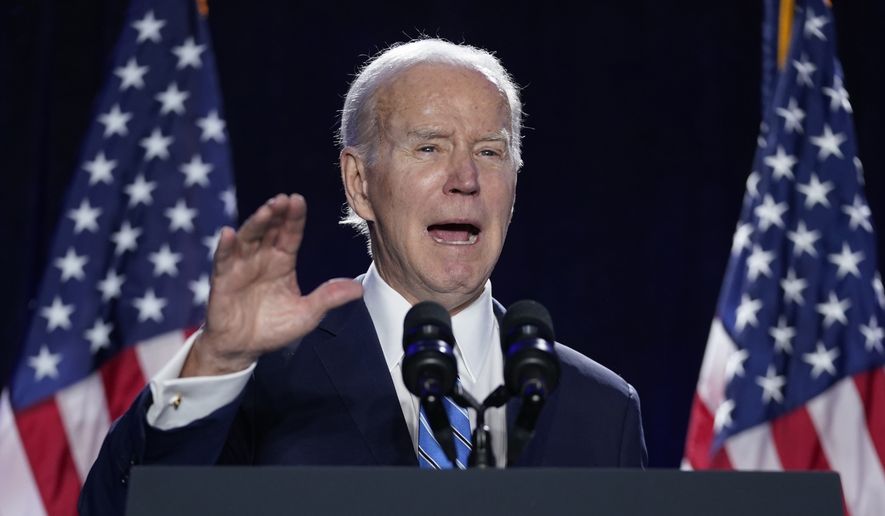President Biden is proposing more money to go after pandemic fraudsters, and calling on Congress to pass legislation giving investigators and prosecutors more time to bring criminal cases and new powers to recover money from those they can’t prosecute.
Mr. Biden also asked Capitol Hill to pony up money to help those whose identities were stolen by fraudsters.
The proposals, which the president is announcing Thursday, mark a new level of commitment to sniff out the cataclysmic levels of fraud that analysts say plagued the big pandemic-assistance programs.
“We want to pursue, punish and prosecute the worst wrongdoers. We also want to send a message that that’s going to happen, so there’s deterrence,” said Gene Sperling, Mr. Biden’s point man on pandemic recovery policy.
In total, the administration is asking Congress for $1.6 billion in new funding.
Some $600 million would go to boost investigation and prosecution of major pandemic fraud cases. Another $600 million would go to fraud prevention, with an eye to making corrections to what went wrong in 2020. The final $400 million would go to help those whose identities were stolen repair the financial damage.
Mr. Biden will also propose legislation to Congress, taking some of the top ideas from the government’s community of inspectors general.
One of those is offering to let states keep 5% of any fraudulent money they recover. The theory is that states don’t have an incentive to recover money right now because most of the fraud took place with federal dollars. Giving states a cut of the money could entice them to get serious.
Mr. Biden’s plan also raises the cap on the amount of money that can be recovered through the Fraud Civil Remedies Act from $150,000 to $1 million. Watchdogs say that gives them more leeway to at least get taxpayers’ money back in cases where they don’t have the capacity to bring a criminal case, but where the level of malfeasance was still quite high.
The president’s proposal also adopts the watchdog community’s suggestion to double the statute of limitations for pursuing unemployment-fraud cases from 5 to 10 years. Congress already made a similar move for fraud in pandemic small-business loans, and watchdogs had pleaded for extra time in the unemployment realm too.
“It takes time to go after the most sophisticated folks,” Mr. Sperling said. “We want to not only capture them, get their funds, we want to send a signal to them that you can run but you cannot hide.”
Estimates of pandemic fraud are staggering.
Of roughly $875 billion spent on pandemic-enhanced unemployment benefits, one analysis put fraud at $400 billion. Even the low-end estimate by the Labor Department’s inspector general says it’s at least $71 billion.
Particularly frightening is the amount stolen by criminal syndicates abroad, including ones backed by adversary governments in Russia and China.
The two main pandemic loan programs at the Small Business Administration were also major targets for fraud. And reports are emerging that other programs, such as rental assistance, were bilked.
Fraud was rampant because the government, intent on getting assistance out the door, cut corners. The SBA paid loans without checking to see if applicants were on the Treasury Department’s Do Not Pay list.
States paid unemployment benefits based solely on an applicant’s claim of having been put out of work. Old, clunky systems and instructions to forgo even rudimentary checks made it easy for fraudsters to file reams of applications.
Names and Social Security numbers could be bought off the dark web for less than $10 apiece. In some cases, people went through phone lists for names. Inmates also scrounged identities from others behind bars with them, giving them to someone on the outside to file under.
Not all identities would be successful, but scammers could file reams of applications, figuring maybe one in five would get through. A single successful unemployment claim could net tens of thousands of dollars in benefits, so it didn’t take many approvals to make a lot of money.
Mr. Biden’s new proposals come just days after House Republicans advanced legislation that covers many of the same areas.
The White House rejected the idea that it was being prodded into action by the newly ascendant GOP, which has already held multiple hearings on fraud.
Mr. Sperling said Mr. Biden, who took on the nickname of “Sheriff Joe” for his efforts as vice president to sniff out fraud from the stimulus bill that passed after the 2008 financial collapse, was intent on targeting fraudsters from the start of his tenure in the White House.
Mr. Sperling said he hopes for bipartisanship on Mr. Biden’s plans, which has some overlap with what the GOP is pursuing.
House Republicans’ bill would give states a 25% cut of any fraudulent federal pandemic unemployment benefits they recover. That’s five times higher than Mr. Biden’s proposal.
The GOP bill would also include the extension of the time limit for bringing cases of unemployment fraud to 10 years.
The bill cleared the House Ways and Means Committee on Tuesday on a 20-17 vote.
Democrats objected to the legislation, arguing that it could end up snaring people who got overpayments but didn’t really intend to defraud the government. Democrats predicted that states would “harass” workers.
Democrats also complained that the legislation would rescind some of the money their party directed to states in their 2021 coronavirus stimulus law.
For more information, visit The Washington Times COVID-19 resource page.
• Stephen Dinan can be reached at sdinan@washingtontimes.com.




Please read our comment policy before commenting.